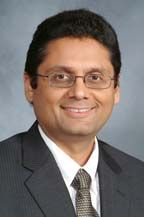New Drugs, Immuno-Oncology Advances Gastric Cancer Treatment Paradigm
Immuno-oncology and the classification of subtypes of gastric cancer could greatly advance treatment efficacy and variation, according to Manish A. Shah, MD.
Manish A. Shah, MDD

Manish A. Shah, MD
Immuno-oncology and the classification of subtypes of gastric cancer could greatly advance treatment efficacy and variation, according to Manish A. Shah, MD.
In an interview withTargeted Oncology, Shah, medical oncologist, Bartlett Associate Professor of GI Oncology, Weill Cornell Medical Center at NewYork-Presbyterian Hospital, discusses the recently approved drug ramucirumab (Cyramza) for gastric cancer, the importance of further research into the field of immuno-oncology, and how securing funding for research has become a problem within the malignancy.
TARGETED ONCOLOGY:Can you talk about advancements in terms of treatment, and what you see on the horizon in gastric cancer?
Shah:
In the last few years, we've had the approval of two new targeted agents to attack the disease. One is ramucirumab, and that's an antibody to a protein called VEGFR-2, and it is thought to block the blood vessel’s supply to the tumor. That's a pretty exciting area, and it was approved in the second-line and third-line setting. There's an ongoing study that just finished accrual in the first-line setting. The idea is that chemotherapy with ramucirumab may improve outcomes and survival, and may be a new standard paradigm within this disease.
Another targeted drug that was approved two years prior was trastuzumab (Herceptin), and that was approved for tumors that overexpress HER2, which is a growth protein on the cell surface of about 20% of gastric and esophageal cancer cells. That's also changed our treatment paradigm. So now every patient that has gastric and esophageal cancer gets tested for HER2, and if you're HER2 positive, then you would actually go on chemotherapy with trastuzumab to try to treat the disease better.
Those are just from a targeted therapies standpoint. Then most recently, there's a lot of excitement with immuno-oncology where we active the immune system to fight the cancer. It's actually very interesting, the way that cancers have evolved is that it can turn off the immune system, or hide itself from the immune system. The way that it does that is that it overexpresses proteins that negatively regulate the T-cells, which are the portion of the immune system that actually are meant to survey the body for any foreign proteins and foreign antigens. There are drugs that now block these negative signals so it unmasks the cancer from the immune system, and allows the immune system to fight the cancer. Those studies are ongoing. Hopefully in the next year or so, drugs that activate the immune system will also be a part of our armamentarium against the disease.
One of the most exciting things actually is not just treating metastatic disease, but treating patients who are curable with localized disease. We have a study involving chemotherapy and radiation with one of these immuno-oncology drugs. So that's pretty exciting and pretty novel. For esophageal adenocarcinoma, we're the only site in the city that has this clinical trial. That should be open soon.
TARGETED ONCOLOGY:How has the classification of different types of gastric cancer helped with treatment?
Shah:
That's an emerging area. They're based on epidemiology and on molecular profiling of the cancers. We've identified several different subtypes of cancer that behave differently. One subtype is what we call the genomically stable subtype, which is diffuse gastric cancer. These gastric cancers do not benefit from the immuno-oncology drugs, but we're doing research right now to try to understand what it is about these cancers that may make them sensitive to another class of drugs called taxanes. That's work that's being done here, where we are looking at specific mutations within these diseases that may, although make them resistant to one class of drugs, makes them more sensitive to another class of drugs. That's pretty exciting.
TARGETED ONCOLOGY:What are the main challenges in the field that you would like to see tackled?
Shah:
As important as these diseases are globally, together esophagus and gastric cancer affect more than 1.2 million people per year worldwide. They're not so prevalent in the United States, who has about 45,000 to 50,000 patients per year. I'd say it's about the same number as people who get pancreatic cancer. I think increasing awareness of the disease and increasing our funding for research would be a great benefit. We're in a new era of precision medicine and novel therapies for many of our cancers. The cancers that seem to have often the new drugs and new trials that are more prevalent in the United States, but I think these cancers could also benefit from drug development. So increasing awareness and funding for research would be the most important thing.
TARGETED ONCOLOGY:Can you tell us a little about your immunotherapy studies in esophageal cancer?
Shah: